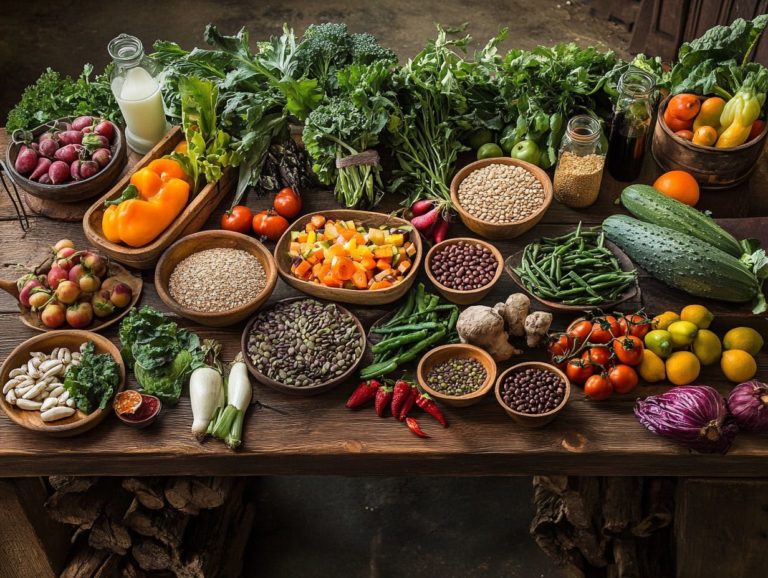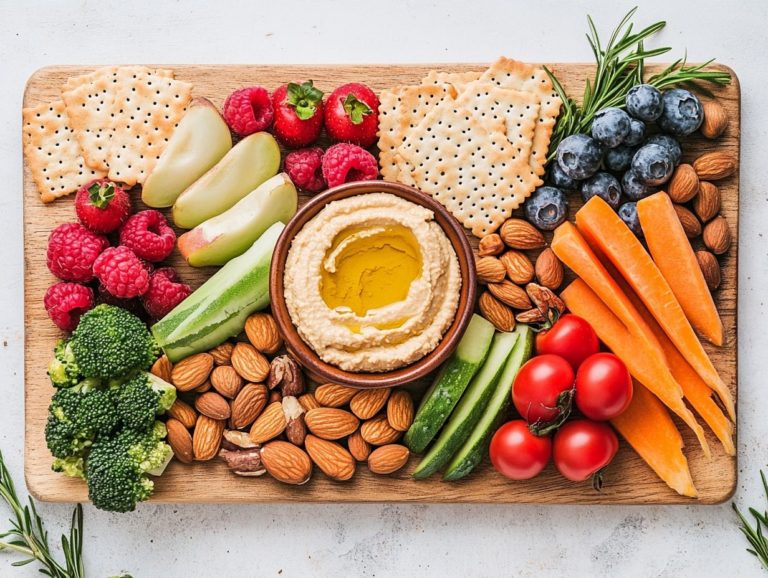The Role of Gratitude in Mindful Eating Practices
In a fast-paced world where meals often become a hurried affair, embracing the concept of mindful eating provides a refreshing way to deepen your relationship with food.
This guide shows how mindfulness and gratitude can make your meals more enjoyable. By grasping the essence of mindful eating and learning to infuse gratitude into each meal, you can significantly enhance your overall well-being.
Discover simple practices that will transform how you relate to food and nurture a greater appreciation for the nourishment it offers.
Engage in cultivating a more mindful and grateful approach to eating, unlocking profound benefits for both your body and mind.
Contents
- Key Takeaways:
- The Importance of Mindful Eating
- Practicing Gratitude in Mindful Eating
- Incorporating Gratitude in Daily Meals
- Benefits of Combining Gratitude and Mindful Eating
- Tips for Maintaining a Grateful and Mindful Eating Practice
- Frequently Asked Questions
- What is the role of gratitude in mindful eating practices?
- How does practicing gratitude while eating benefit our overall well-being?
- Can gratitude help with weight management?
- Is it necessary to express gratitude out loud while eating?
- What are some simple ways to practice gratitude while eating?
- How can incorporating gratitude into mealtime benefit our relationships?
Key Takeaways:
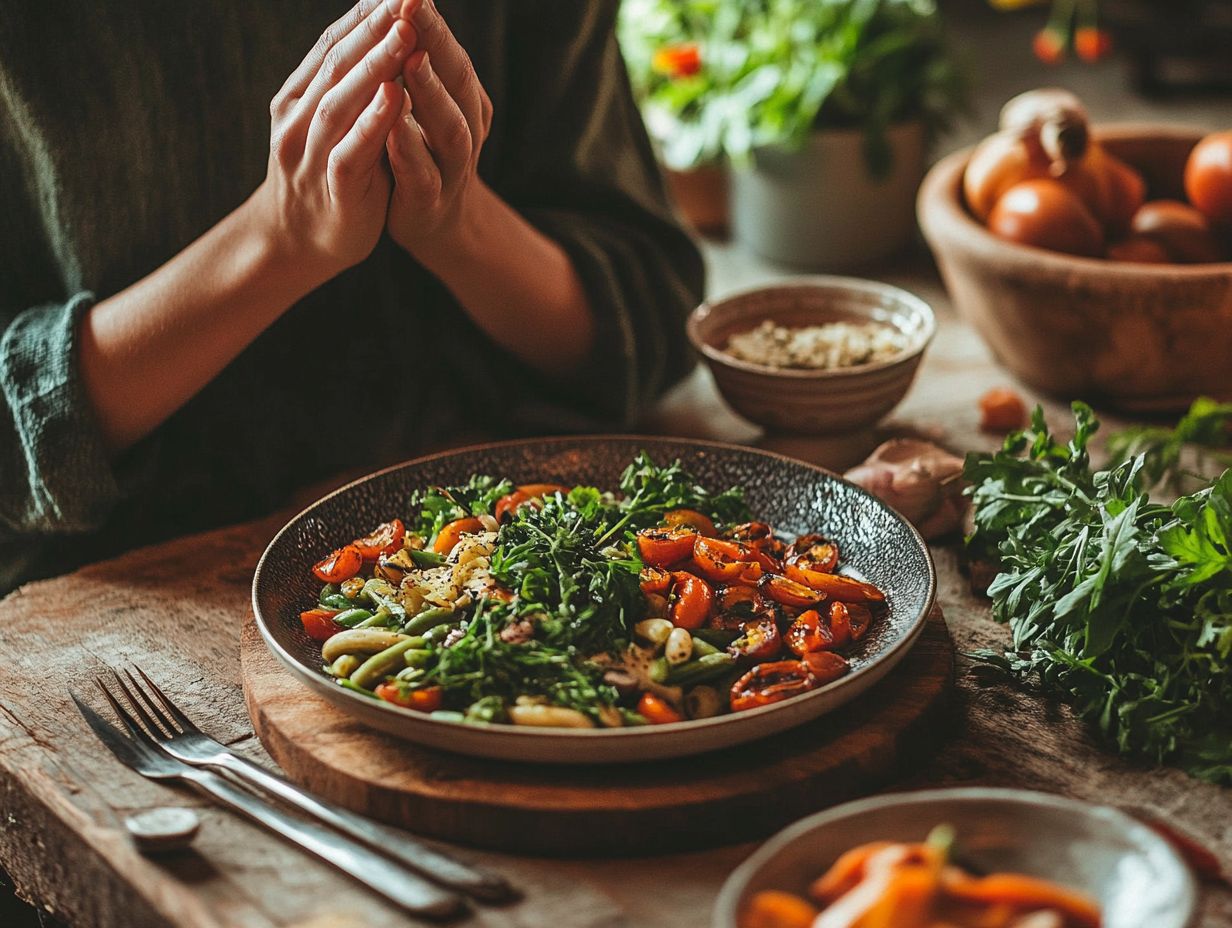
The Importance of Mindful Eating
Mindful eating is a transformative practice that invites you to forge a deeper connection with your food. This approach not only encourages healthier eating habits but also enhances your overall emotional well-being and mental health.
By integrating mindfulness into your eating experience, you become more attuned to your hunger cues signals your body sends when it needs food and emotional triggers, enabling you to make conscious choices that support both digestion and nutritional value.
This approach encourages you to appreciate your food more, fostering a sense of gratitude and presence during meals. This enriches your sensory experience and contributes to lasting health benefits.
Understanding Mindful Eating
Understanding mindful eating means recognizing the intricate relationship between food, awareness, and emotions, guiding you toward greater self-awareness and body awareness in your eating practices.
This approach invites you to slow down and savor each bite, fostering deeper sensory engagement with your food. By paying close attention to the flavors, textures, and aromas, you can cultivate a more enriching experience that goes beyond mere sustenance.
Mindful eating encourages you to explore the emotional triggers tied to your food choices, creating a pathway to healthier habits and improved well-being.
It emphasizes the importance of tuning into your body’s signals, helping you distinguish between genuine hunger and emotional cravings. This holistic practice nurtures your connection with food and enhances your overall mindfulness in daily life.
Practicing Gratitude in Mindful Eating
Practicing gratitude during mindful eating catalyzes a remarkable transformation in how you experience meals. This approach, which acknowledges the role of senses in mindful eating practices, fosters joy and emotional well-being throughout the eating process.
How Gratitude Enhances Mindful Eating
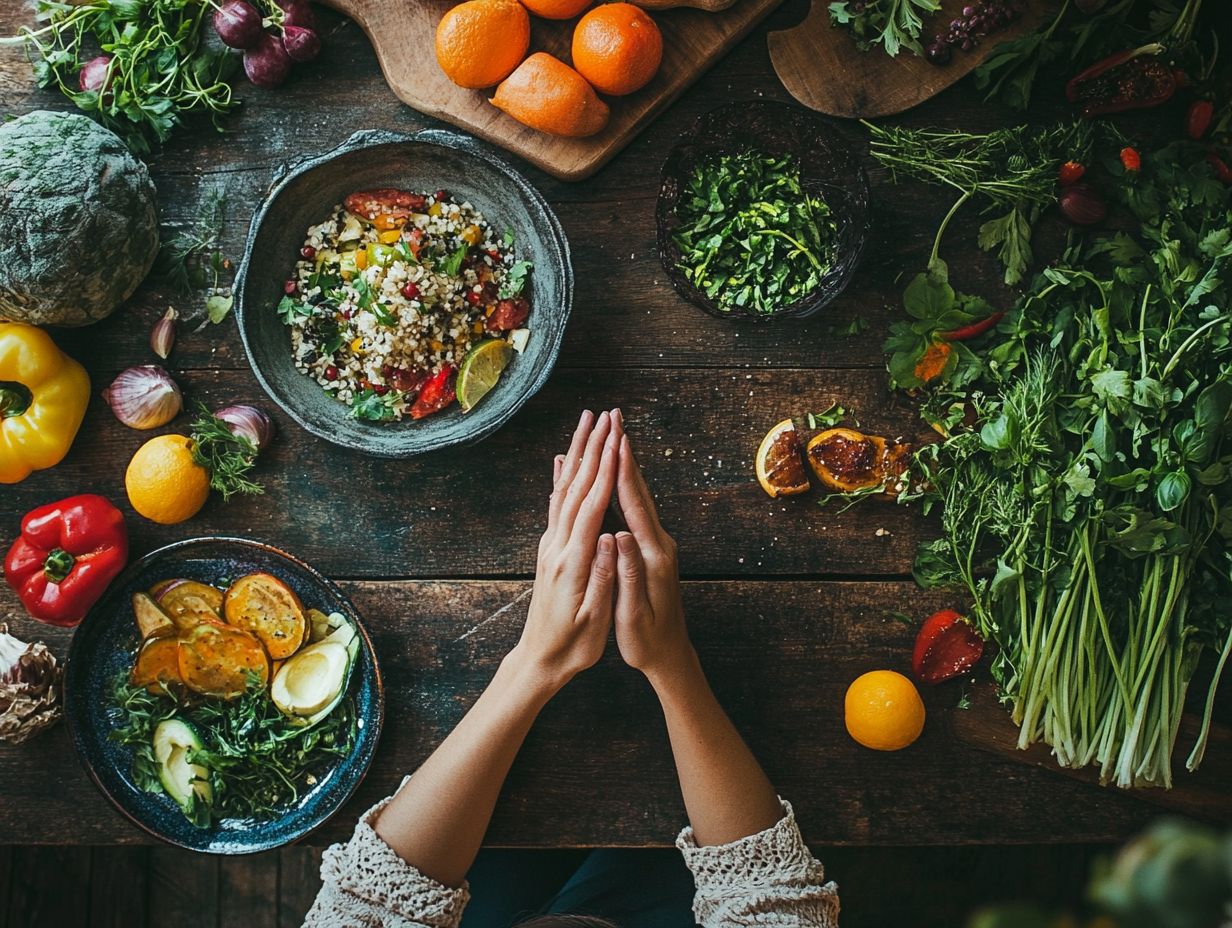
Gratitude enriches your mindful eating journey by shifting your focus from scarcity to abundance, elevating the emotional health tied to your food experiences and fostering a deeper sense of mindful eating.
When you actively practice gratitude, you begin to savor the flavors, textures, and colors of your meals instead of rushing through them or eating while distracted. This shift encourages a more profound connection to your eating experience, ultimately improving digestion and enhancing your awareness of hunger cues.
Research shows that individuals who regularly express gratitude tend to experience lower levels of stress and anxiety, which can help curb emotional eating tendencies.
For instance, taking a moment before your meals to reflect on what you’re grateful for can transform an ordinary meal into a celebration, boosting your satisfaction and steering you toward healthier choices.
Incorporating Gratitude in Daily Meals
Incorporating gratitude into your daily meals elevates your eating experience. It helps you savor each bite while appreciating the rich cultural traditions behind it.
This mindful approach fosters a deeper connection with your community. Sharing meals becomes a joyful experience.
Simple Ways to Practice Gratitude While Eating
Practicing gratitude while eating can enhance your dining experience. Use awareness exercises to stay present during meals.
Before each bite, take a moment for mindful breathing. This helps center your thoughts and appreciate your food.
Create appreciation rituals, like expressing thanks for those who grew or prepared your food. This deepens your connection with your meal.
Reflect on the origins of your ingredients. This enriches each meal, making it a heartfelt experience.
By incorporating these practices, you’ll cultivate lasting gratitude. Every meal becomes an opportunity for reflection and joy.
Benefits of Combining Gratitude and Mindful Eating
Merging gratitude with mindful eating offers many advantages. It fosters a healthier relationship with food and your body.
Improved Relationship with Food and Body
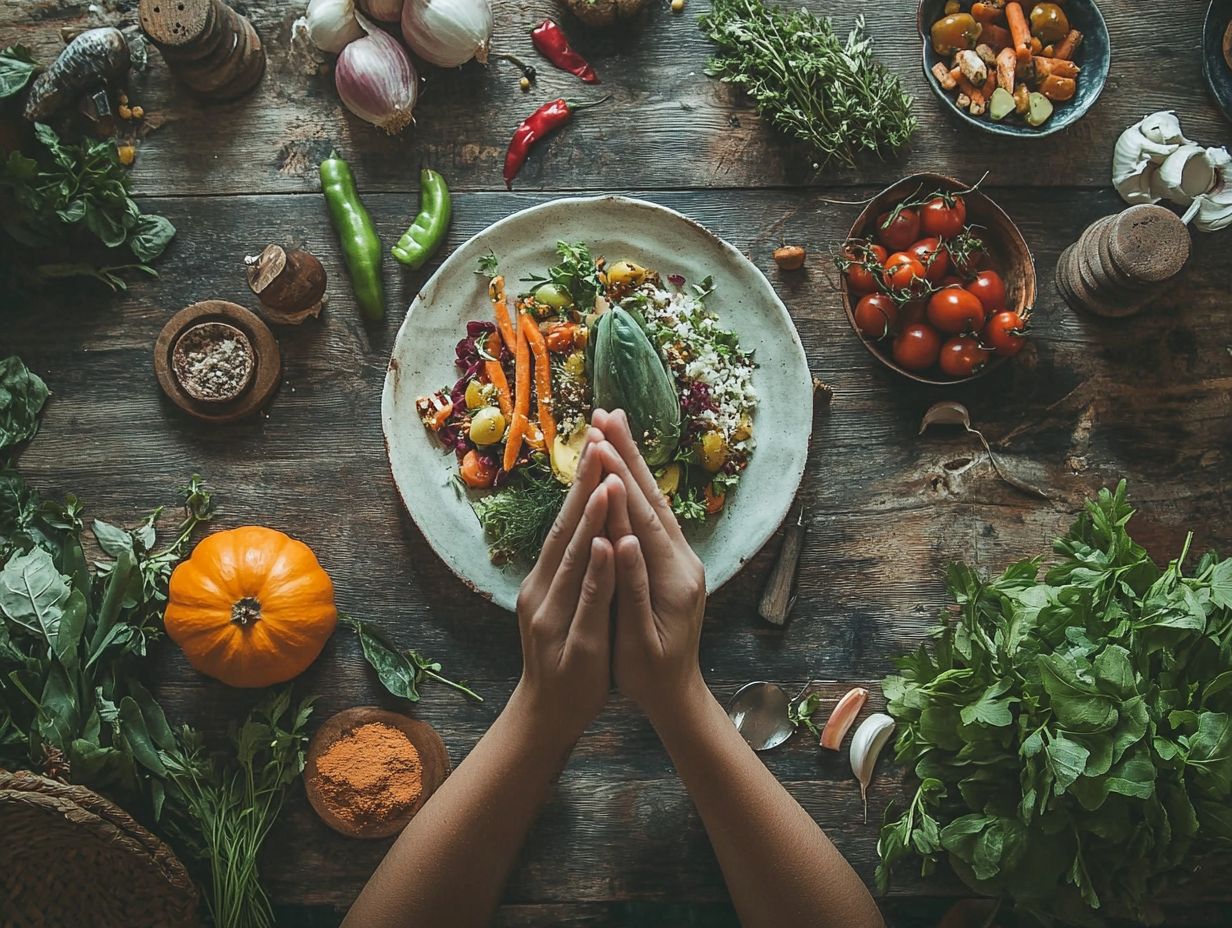
A key benefit of gratitude is a healthier relationship with food. It can reduce emotional eating and encourage self-reflection.
For many, eating ties into emotions, leading to choices made from stress or anxiety. By appreciating the flavors and textures of your meal, you can prioritize nourishment over fleeting comfort.
One woman found that shifting her mindset helped her enjoy a wholesome salad instead of sugary snacks after a long day. This awareness curbed her emotional eating and deepened her connection with food.
Enhanced Overall Well-being
Integrating gratitude into your eating can significantly enhance your well-being. It leads to reduced stress and improved emotional health.
This blend of appreciation and attentiveness creates a deeper connection with your food. It fosters greater satisfaction and fulfillment.
Research shows that people who practice gratitude report lower anxiety and depression. This reveals a strong link between positive emotions and mental well-being.
Participants in mindful eating programs often describe how acknowledging their food transforms their relationship with hunger. They feel more content and less inclined toward emotional eating.
Tips for Maintaining a Grateful and Mindful Eating Practice
Maintaining a grateful and mindful eating practice requires dedication. This approach helps you face challenges while enhancing your emotional well-being.
It’s about cultivating a deeper connection with your meals. Each meal becomes an opportunity for growth and appreciation.
Overcoming Challenges and Staying Consistent
Overcoming challenges in mindful eating requires you to develop self-awareness and pinpoint triggers situations or feelings that lead to unhealthy eating habits that might disrupt the consistency of this enriching practice. This ultimately supports your emotional well-being.
This journey can often feel overwhelming. The fast pace of modern life encourages hurried meals and distractions, making it challenging to fully immerse yourself in the present moment.
To tackle these obstacles, consider creating a designated eating environment, free of electronic devices. Here, you can savor each bite and focus on the flavors and textures of your food.
Incorporating gratitude practices elevates the experience. Taking a moment before meals to acknowledge the effort that went into preparing your food fosters a deeper appreciation for what s on your plate.
Simple strategies, like setting a timer for mindful pauses during meals or keeping a food journal to track the emotions tied to your eating habits, can reinforce these practices over time. They help you cultivate a more fulfilling relationship with food.
Frequently Asked Questions
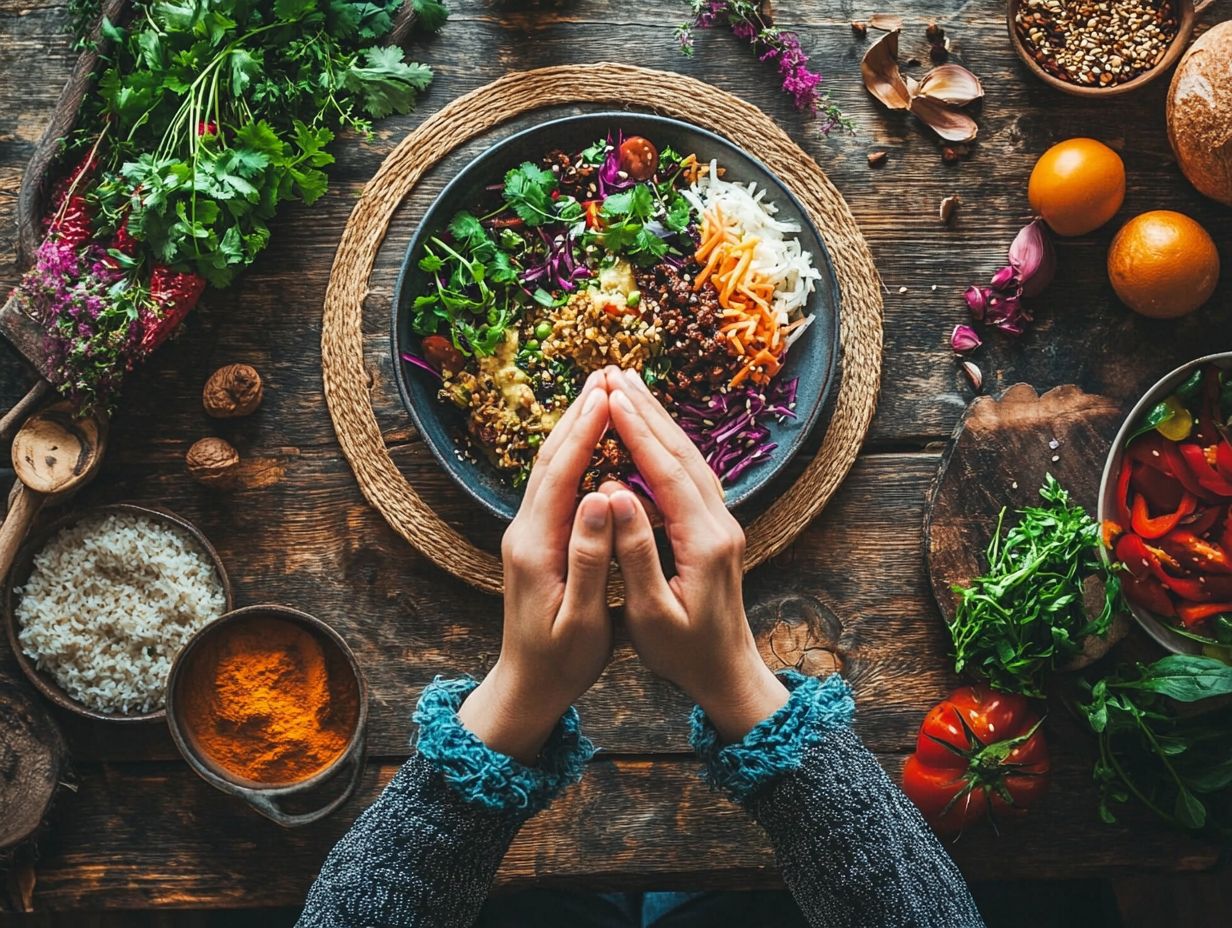
What is the role of gratitude in mindful eating practices?
The role of gratitude in mindful eating practices is to help individuals develop a deeper awareness and appreciation for the food they eat. This approach slows down the eating process, increases satisfaction, and promotes a more positive relationship with food, as highlighted in the role of mindfulness in healthy eating habits.
How does practicing gratitude while eating benefit our overall well-being?
Practicing gratitude while eating reduces stress, improves digestion, and increases feelings of happiness and contentment. It helps you choose healthier foods and boosts your body image.
Can gratitude help with weight management?
Yes, gratitude plays a significant role in weight management. By being more mindful and grateful for the food we eat, we are less likely to overeat or resort to emotional eating. It also helps us appreciate our bodies and make healthier choices that support weight loss or maintenance.
Is it necessary to express gratitude out loud while eating?
No, expressing gratitude out loud while eating is not necessary. It can be done silently in your mind. The important thing is to truly feel and acknowledge the gratitude for your food.
What are some simple ways to practice gratitude while eating?
Some simple ways to practice gratitude while eating include taking a moment to pause before eating, reflecting on where your food came from, and savoring each bite. You can also express gratitude for the people involved in the production and preparation of your food.
How can incorporating gratitude into mealtime benefit our relationships?
Incorporating gratitude into mealtime improves our relationships by fostering a sense of connection and appreciation for those we share the meal with. It helps us be more present and attentive to our loved ones, leading to more meaningful and enjoyable interactions.




